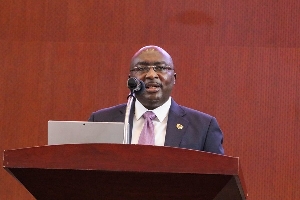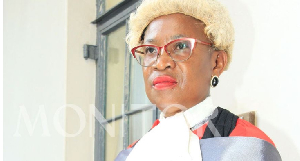- Home - News
- TWI News | TV
- Polls
- Year In Review
- News Archive
- Crime & Punishment
- Politics
- Regional
- Editorial
- Health
- Ghanaians Abroad
- Tabloid
- Africa
- Religion
- Election 2020
- Coronavirus
- News Videos | TV
- Photo Archives
- News Headlines
- Press Release
General News of Sunday, 24 June 2012
Source: GNA
Sustainable development cannot be achieved without sufficient resources-Minister
Ms Sherry Ayittey, Minister of Environment, Science and Technology, has observed that sustainable development cannot be realised without the strengthening of accessible, responsive, sufficiently resourced and truly representative institutions at all levels.
She said the challenge was even greater with increased fragmentation of limited resources, duplication of mandates and scattered secretariats of related institutions.
Ms Ayittey was speaking to delegates at the just ended United Nations Conference on Sustainable Development dubbed: “Rio+20” in Rio de Janeiro, Brazil.
She noted that it was therefore important to streamline the operations of existing institutions in order to reduce transaction costs and channel the limited financial resources to the implementation of agreed outcomes.
Ms Ayittey told the delegates that attempts have also been made to mainstream climate change into sectoral and district plans; however there was a need to intensify efforts to ensure that policies and development frameworks deliver tangible sustainable development solutions.
She noted that the implementation of sustainable land management practices and the restoration of degraded lands could help address several global challenges including poverty, food insecurity, biodiversity loss, drought and water scarcity and climate change adaptation.
Ms Ayittey said: “To effectively address land degradation, there should be significant scale up of resources from the operating mechanism to the convention on desertification, land degradation, and drought to enable it monitor global land degradation and restore degraded lands.”
She told the audience that to better understand and access the extent of land degradation, it was necessary to set up an inter-governmental panel on science as it was the case of biodiversity and climate change.
She called on the UN system to further undertake the necessary studies to reveal the real identity of the green economy and foster knowledge sharing for a commonly accepted approach to its adoption.
She expressed the concern that Africa’s progress towards sustainable development was being severely compromised by new and emerging challenges.
These include the impact of climate change, increasing water scarcity, biodiversity and ecosystem loss, desertification, hazardous and electronic waste, low resilience to natural disasters, energy crisis and food crisis among other challenges.
Ms Ayittey explained that these challenges have led to the spread of new diseases, worsening poverty, and unemployment, especially of the youth in the region.
She said world leaders need to urgently strengthen the institutional framework for sustainable development to respond coherently and effectively to current and future challenges.
“Institutional reforms should therefore embrace elements to enhance dialogue and participation of ... stakeholders within the framework of the UN system,” she added.**










